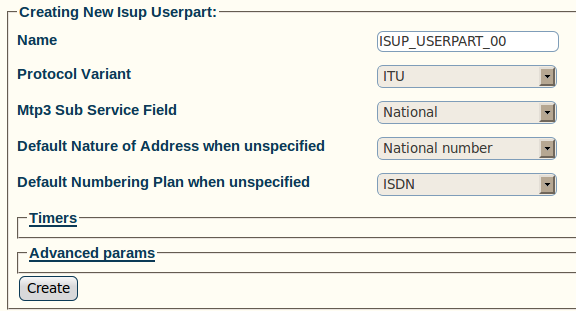Toolpack:Creating an ISUP User Part A
| Line 21: | Line 21: | ||
* Select an '''address indicator type''' | * Select an '''address indicator type''' | ||
* Select a '''[[Numbering Plan]]''' | * Select a '''[[Numbering Plan]]''' | ||
| − | |||
* Click '''Create''' | * Click '''Create''' | ||
| Line 29: | Line 28: | ||
[[Image:Toolpack_v2.5_ISUP_Userpart_Created.png]] | [[Image:Toolpack_v2.5_ISUP_Userpart_Created.png]] | ||
| + | |||
| + | |||
| + | ==List of Parameters== | ||
| + | |||
| + | * [[Parameter: Name|Name]] | ||
| + | * [[Parameter: Protocol Variant|Protocol Variant]] | ||
| + | * [[Parameter: Subservice Field|MTP3 Subservice field]] | ||
| + | * [[Parameter: Address Indicator Type|Address Indicator Type]] | ||
| + | * [[Parameter: Numbering Plan|Numbering Plan]] | ||
Revision as of 14:47, 4 August 2010
Now that you have created your ISUP network, you must create a new ISUP user part.
The user part is the container for the multiple ISUP interfaces. One user part is required for each protocol variant.
Multiple ISUP user parts can be instantiated within a single ISUP protocol layer. This allows a user application to interface with multiple SS7 ISUP protocol variants at the same time. Only one ISUP user part is required for a specific variant as it can be assigned to multiple ISUP networks.
A user part can easily be seen as a protocol variant that a host application wants to use on the SS7 network.
To create an ISUP user part:
1- Click Create New Isup Userpart in the ISUP stack configuration window:
2- Configure the new ISUP user part:
- Enter a name for the user part
- Select a protocol variant (depending on location)
- Select an MTP3 sub service field (the same that was previously set for MTP3)
- Select an address indicator type
- Select a Numbering Plan
- Click Create
3- Verify that the "IsupUserpart was successfully created" message appears

